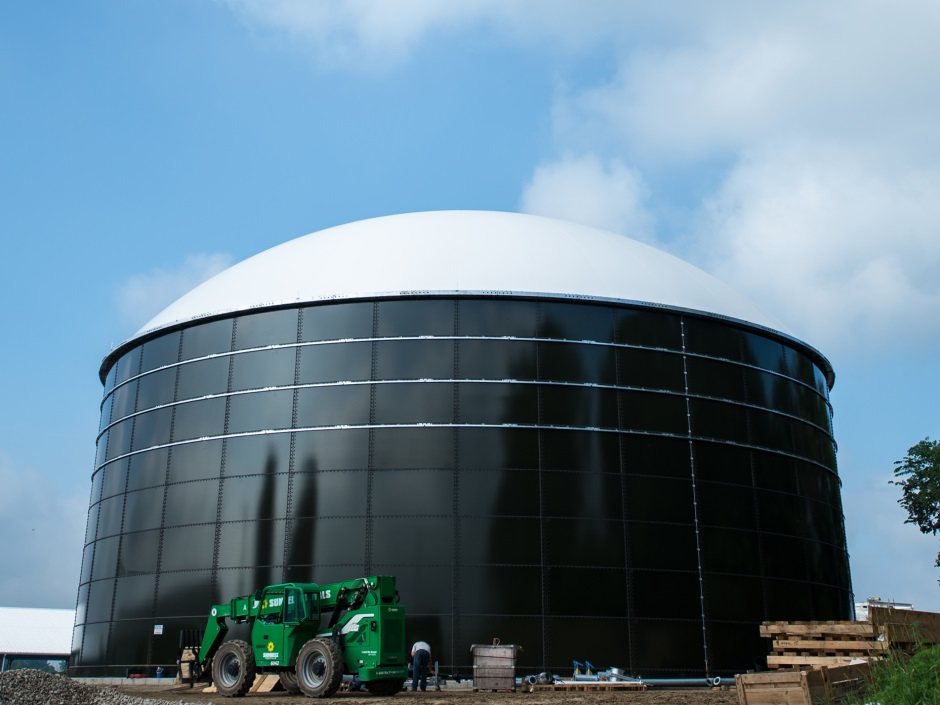
Good Digestion: Local Project Aims To Turn Farm Waste Into Renewable Energy
By Craig Manning | Aug. 21, 2022
What if the waste from local agriculture could be used to generate renewable energy? It’s a question that Tyler Glaze of Short’s Brewing Company has been asking for years, and now he’s taking matters into his own hands to make the concept a reality in northern Michigan.
Glaze serves as chief operating officer at Short’s, a job he worked his way up to after joining the company as an intern back in 2011. In his spare time, he’s currently leading a push to bring a “community cooperative digester” to the region. Digester systems use the scientific concepts and processes of anaerobic digestion to break down organic waste and turn it into usable byproducts, including renewable energy.
While Glaze is taking on the digester project separate from his role with Short’s, he says the digester system, if it comes to fruition, would benefit the agricultural community to which craft breweries belong. Essentially, digesters work by taking a variety of “digestible material” – often including animal manure, food waste, agricultural or yard waste, and other organic materials – and putting them into a multi-tank system where the actual anaerobic digestion process takes place. Having a digester in the region, Glaze says, would provide a new avenue for local agricultural players to dispose of organic materials used or produced as waste on their farms. “We have a number of farms – including cherry growers, winemakers, and dairies – that would provide incoming streams of digestible material,” he tells The Ticker.
What actually happens to these materials in the digester? Most digester systems start by heating organic materials to a high temperature, in order to kill bacteria and other potential pathogens. The materials are then pumped into a sealed, airtight tank devoid of oxygen, where they continue to be heated for several weeks while microorganisms in the digester slowly break down the mixture of digestible material. There are two main byproducts to this breakdown process – a “biogas” and a nutrient-rich digestate – both of which have their beneficial uses. Biogas, which consists largely of methane, is a form of renewable energy that can be used to generate electricity, heat, or mechanical power. Nutrient-rich digestate, meanwhile, can be used as fertilizer or for soil improvement purposes.
There are currently more than 100 digesters scattered throughout the state of Michigan. Michigan State University (MSU), for example, has operated a digester on its south campus since 2013 (pictured) – one of the few university-owned digester systems in the country. That digester takes in food waste from the university's dining halls, manure from the MSU dairy farm, grease from restaurants, biodegradable packing material, and a range of other organic materials from around the Lansing area and throughout the state. Per MSU, the digester produces enough biogas energy to power 250-300 homes, with the energy mostly used to offset power needs at 10 buildings on the university’s south campus. Additionally, the university uses the digestate produced by the process “to fertilize croplands or other biological treatment processes to fuel research opportunities.” MSU cites a reduced campus footprint and minimized odors from organic waste among the key benefits of the system.
Glaze’s mission is to bring similar benefits to northern Michigan. His initial goal was “to get a project rolling to accept more digestible material” at the Traverse City Wastewater Treatment Plant.” The city, though, ultimately ruled that option to be unfeasible.
“Our operations team received pushback from the city regarding traffic on Woodmere and across the Tart Trail,” Glaze explains. “[The City of Traverse City] would be the absolute optimal group to install something like this, but the geographic location of the plant is not ideal for the incoming trucks [that would be delivering digestible material], so their hands are tied. It's a shame they won't be able to expand their biogas operations and generate clean energy from readily available material, but that leaves the door open for our group to take a crack at it.”
While Glaze notes that he and his collaborators are still early in the process of getting the digester off the ground, he also says that some big pieces are starting to fall into place. He’s working with the team at HKM & Associates – a TC-based consulting firm that specializes in fundraising and development – “to develop grants, messaging, and support for the project.” At the same time, he's exploring engineering firms that could lead the way in designing and building the digester system itself, and is in talks with local farmers, winemakers, and brewers who might be interested in using the digester to dispose of their organic waste.
Where would the digester actually be situated, given that the city wastewater treatment plant isn’t an option? Glaze isn’t ready to share that information just yet, but confirms that he has a local farm owner on deck who wants to accommodate the digester on their property. “They are going to be the ones to own and house the system in its current capacity,” Glaze says of the farm. He adds that the energy and digestate byproducts of the system should be able to offer “a beneficial revenue stream for their century farm.”
Glaze expects that the digester initiative will gain traction “very quickly in the coming months” as he and his collaborators work to generate local buzz and secure project funds. Things could accelerate particularly fast if the project team is able to land any public dollars for the project – something Glaze sees as a distinct possibility.
“With so much American Rescue Plan Act money [out there], and with the Inflation Reduction Act being signed into law, there is a lot of money available and dedicated to projects like this right now,” he says. “There really hasn't been a better time to get this rolling. It's just going to take someone to get the ball rolling, and I hope we can be the one.”
Comment







